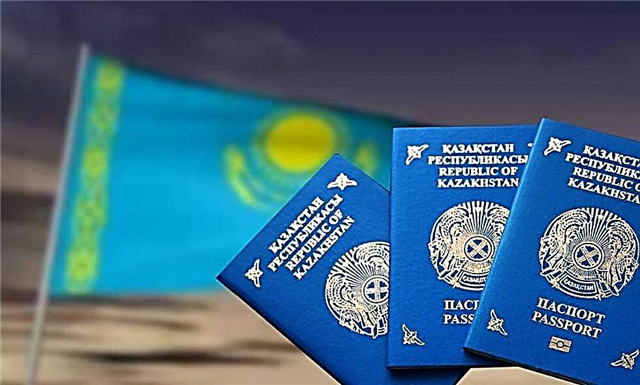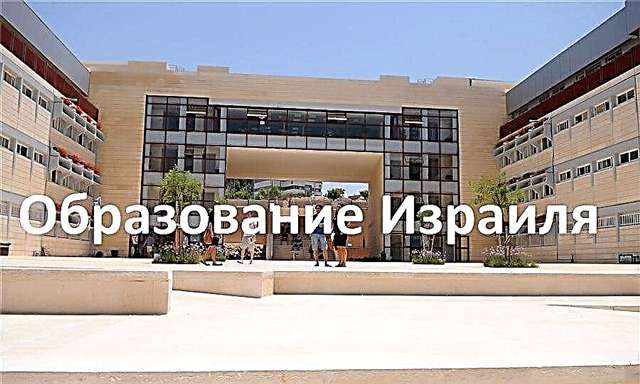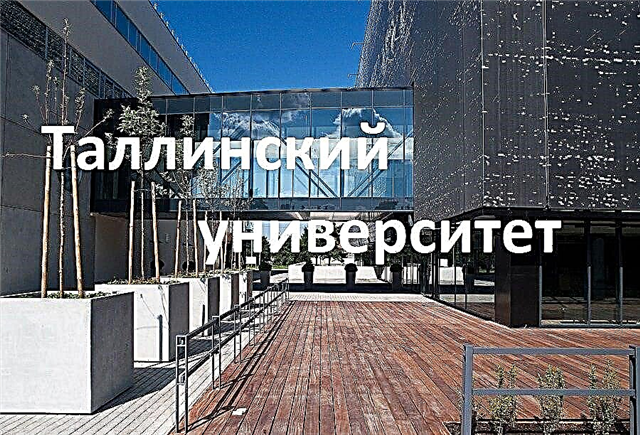Estonia is a small country, but it is developing very quickly and diversely. Diversified industry annually provides GDP growth in 3-4%without forgetting about the development of the educational sphere. There are 25 educational institutions in the Estonian higher education system, where about 60 thousand students receive knowledge, of which about 4 thousand are Russians, Ukrainians, and Belarusians.
Tallinn University
Tallinn University is a top 5 educational institution in Estonia. He is traditionally in the top 5% the best universities in the world. The Tallinn University diploma is recognized in most European countries and even the world.

Although the share of the Russian-speaking population in Estonia is 30%, in universities there are only single programs with training in Russian. Applicants should focus on English, which is the prevailing language of instruction in Estonian higher education.
Those who intend to live and work in Estonia after graduation will have to learn the state language of the country. If the applicant has firmly decided to get higher education at an Estonian university according to a program with teaching in Russian, then one cannot do without a fundamental knowledge of the Estonian language.
Living in Estonia is comfortable: the abundance of the Russian-speaking population does not make you feel like a stranger. A Russian, a Belarusian, a Ukrainian receive a European-style diploma here and get used to living in an atmosphere of leisurely calm, law-abidingness among the beauties of the nature of the North Sea country. Estonia ranks 33rd among 163 countries in terms of safety of residence.
Higher education
The level of education in Estonian universities is two-stage:
- Bachelor's degree (from the age of 16);
- Master's degree (after reaching the age of 19).
The term of study for a bachelor's degree is 3-4 years, for a master's degree - 2 years. There are programs that provide a doctoral level, where the duration of study is 4 years.
Traditionally, classes begin in September, the study lasts for 2 semesters. Both full-time and distance learning are available. There are no gender restrictions for foreigners here, the main condition is a high level of knowledge and language - English or Estonian.

The standards of Estonian higher education correspond to the European Credit Transfer and Accumulation System - ECTS, which provides for the accumulation of hours of study, practical, laboratory studies by students, measured in credits. For 1 academic year, a student can collect about 60 credits, which corresponds to 1500-1800 academic hours. To master a bachelor's degree, you need to accumulate 180-240 credits, master's - at least 300 credits.
You May Also Like
Estonian universities offer their citizens and foreigners to receive diplomas in a variety of specialties of different profiles in more than 300 programs, 150 of them in English.
At the end of each semester, students are certified according to the results of their studies, conducting:
- Level grades;
- Exams;
- Independent and internal certifications.
Based on the results of attestations and passing exams, teachers make a conclusion about the transfer of the student to the next stage of study or about the assignment of a bachelor's or master's qualification.
Education programs
Estonian universities are divided into two types:
- Applied;
- Universities.
The first type of institutions of higher education provides education no higher than a bachelor's degree, the second - all possible degrees of education (bachelor's, master's, postgraduate, doctoral studies) in various specialties.
On a note! It should be noted that there is no division into bachelor's and master's degrees at the faculties where medicine and engineering are studied.
Technological education has received special recognition in European countries, because it was here that the world-famous Skype was developed and implemented. IT universities are involved in the following partnership programs:
- Oracle Academy;
- Cisco Networking Academy;
- Microsoft IT Academy;
- MSDN Academic Alliance;
- Linux Professional Institute.
At the university, academy, at the bachelor's level, you must have a document on complete secondary education, for a master's program - on the presence of a bachelor's degree. You can also get a bachelor's degree in colleges: upon graduation, the graduate will receive a higher applied education.
Estonia has both public universities (10) and private (5). For a foreigner, state institutions are more financially beneficial, in which, in addition, more places are allocated for training on a budgetary basis.
You May Also Like
Conditions for admission
When applying to any of the Estonian universities, an applicant must:
- Meet the age limit;
- Have a complete secondary education or higher education in their country (in case the student plans to enroll in a master's degree, doctoral studies);
- For access to higher education, assess the certificate at the Estonian National Information Center for the Official Recognition of Education Certificates (Estonian ENIC / NARIC Center);
- To be fluent in English or Estonian, about which a certificate must be provided;
- Have a high GPA in school;
- Pass an interview with a representative of the university.
Competition in Estonian universities is relatively low: students become approximately 10-30% from the number of all applicants. Passing entrance exams is most often not required; admission is carried out on the basis of the grades contained in the certificate or diploma supplement.

At the end of the 9th grade, Russians have the right to enroll in an Estonian gymnasium or in a vocational secondary school. At the gymnasium, the student will receive an academic education in grades 10-12, after which he will have a chance to apply to any institution of higher education.
People with low grades will not be admitted to the gymnasium: these are the general rules. Graduates of the 11th grade of a secondary Russian school have the right to apply for a place in:
- College;
- University;
- Academy.
List of required documents
The list of documents for admission to Estonian universities looks like this:
- Application form (by type of application);
- A document certifying the presence of education (certificate, diploma of a technical school or a domestic university), notarized;
- Certificate of proficiency in Estonian or English;
- Resume or motivation letter;
- Copy of your passport.

Documents do not have to be submitted in person: it is possible to send papers online, the originals will need to be provided after receiving a notification of admission to the university.
When leaving for study as a student, a foreign national must take care of legal stay in Estonia by applying for a student visa.
Tuition fees in 2021
The cost of educational services in this Baltic state is relatively low when compared with studying in England, Spain, Switzerland.
Tallinn University is a public financial institution, founded in 2005. Educational programs are taught in Estonian and English. The competition here is higher than in other Estonian universities: about 1 out of 10 applicants pass.
Price values:
- You have to pay for bachelor's studies about 3000 euros;
- Master's studies are worth from 1680 euros to 3000 euros.
Other popular universities in Estonia include:
- University of Tartu.For English-language programs at the bachelor's level, the price of study (per year) is 3140 euros, for master's programs - 3200 euros. The medicine will require a fee of 11,000 euros. In addition to training, you will have to pay insurance in the amount of 200 euros per year.
- Medical College in Tallinn.The college prepares first-level specialists, here you can get the prestigious profession of a dental technician, obstetrician, pharmacist, optometrist, etc. The term of study is 2-4.5 years, the cost of training per year varies from 750 to 1800 euros.
- Estonian Business School. This university is private, studying for a bachelor's degree costs 3700-3900 euros, for a master's degree - 8000 euros for the first year, 4000 euros for the second.

Is it possible to get education for free
Free study at a higher education institution in Estonia is a very realistic option. For example, at the University of Tartu, choosing a program with teaching in Estonian, a student will study for free, provided that he / she studies in the full-time form.
Tallinn University of Technology offers free education in technical programs especially for foreign students. Each of the state institutions has budgetary places.
What are the scholarships and grants for foreigners
The Estonian National Scholarship Program for International Students operates at various levels and is only available to representatives of certain countries. Group "B" which includes Russia and Ukraine. The applicant must declare about participation in this program when submitting documents. The amount of the scholarship is 350 euros per month. It is necessary to submit an application from April 1 to April 30 through the Archimedes Foundation.
Scholarships can also be awarded during the period of study, at the initiative of the dean's office on the basis of the transcript of the record drawn up by the dean.
There are a number of other scholarships, including:
- Special;
- Needs-Based Benefit;
- Handbook for Students with Special Needs;
- Foreign Ministry scholarships;
- Playtech Scholarships for Undergraduate Computer Science and Information Technology Students and more
The Dora scholarship program and a number of other scholarship programs operate especially for the magistrate. Each educational institution has its own limit on scholarships and grants.
Cons of owning scholarships:
- Grants for foreigners are provided as if in advance: those who do not meet the mandatory level are deprived of subsidies, and in some cases are required to return previously paid funds;
- The slightest drop in academic performance is immediately reflected in scholarships and opportunities for participation in exchange programs.

Features for internship and study exchange programs
Estonia has great opportunities for internships in other countries and exchange studies. For example, the University of Tartu has concluded bilateral agreements with more than 60 universities in 22 countries.
Estonian universities participate in the following exchange programs between European higher education institutions:
- Erasmus;
- Erasmus Mundus;
- Work and Travel USA;
- Work Experience Canada;
- Working Holiday Canada;
- High School;
- Au Pair, etc.
Internship program, Trainee program - paid internship programs, in fact, are industrial practices, according to the results of which the employer can choose a student as a future employee and offer to book a job.

The choice of states and fields of activity is diverse and allows a potential graduate to self-actualize and assert himself in the correctness of the chosen path of life.
Accommodation and meals for students
Housing is not provided for free: the cost of utilities and maintenance of the housing stock is too high. Most universities have their own dormitories. The University of Tartu provides accommodation in dormitories on the campus, the fee is 120-150 euros depending on the conditions. Tallinn University also has its own housing for students: a place in a hostel costs 100 euro, in a separate dorm room - 270 euros.
Also, a student can rent a living space in Tallinn, the cost is approximately as follows:
- Room - 148-216 USD;
- 1-room apartment - 265-402 USD.
Food is relatively inexpensive: a student in Tallinn will need an amount within 130-280 USD per month depending on the habits and level of the catering company.
On every corner there are cafes, bistros, canteens, and in the housing at the universities there are microwave ovens, kettles, refrigerators. For accommodation and food, the student needs an amount of about 500-600 euros.
Top universities in the country
Estonia, a small territory, is covered by a network of educational institutions of all levels. Among Estonian universities, several institutions, known not only in Europe, but also in the world, are consistently holding the position of the best:
Tallinn University of Technology (Tallinna Tehnikaülikool). Founded in 1918, the type of institution is state. In the world ranking, this institution occupies the 660th line, and in the country TLÜ is in the TOP-5 at number 2. From the data of the official website www.ttu.ee it is known that the percentage of enrolled students is approximately 80% of the number of applicants: the competition is small. The number of students is about 11 thousand, and at least 7% of them are foreigners. The infrastructure includes an observatory and a business center.
University of Tartu.The University of Tartu (UT) is the only one of all the Baltic universities to be part of the Coimbra Group (the union of the oldest universities that have earned worldwide recognition). Subject to good academic performance, diplomas are issued in 2 specialties at once. Tartu has the richest library, superbly equipped laboratories, premises for laboratory work and practical training. This is the best, according to the rating, educational institution of higher education in Estonia. Official website - www.ut.ee. The number of students is approximately 16 thousand annually, of which more than 1000 are foreigners.

Tallinn University.Known under the abbreviation TLÜ, this state university has 5 institutes, 2 colleges and annually teaches about 9 thousand students from all over the world and is considered the second most prestigious in the country. TLÜ is part of the European University Association (EUA). Official website - www.tlu.ee.
Estonian University of Life Sciences.The university is of a state type, in the ranking of the country it takes the 4th place, according to the world assessment it is on the 1799th line. Located in Tartu. About 6 thousand students study here. Enrollment is based on academic performance. Official website - www.emu.ee. Modern equipment, technical equipment allows students to conduct important research.
Reviews about studies
Igor F., 24 years old: He graduated from St. Petersburg with a degree in Applied Mathematics. It seemed that this was not something I wanted to do all my life, and on the advice of a friend, I applied online to the University of Tartu for a master's degree in Software Engineering. At random, I applied for a scholarship. I was extremely pleasantly surprised when I received confirmation not only of enrollment, but also of granting the grant. I study with pleasure, I like everything.
Irina S., 21 years old: I am studying at a bachelor's degree at Tallinn University. I managed to get a scholarship. It is difficult to study, my specialty is taught in Russian, and in the second year I had to closely study Estonian - some of the subjects will be in this difficult language. As a result, I am missing 6 credits, and I have to pay for them. Now I don’t know what will happen to the scholarship - most likely, they will not give it. It is better to initially or thoroughly learn English, or the same Estonian.
It is quite possible to get an education in Estonia. This is an inexpensive option to become the owner of a European-style diploma, and in two specialties at once. For those who get used to it, it is easy to stay and find a job, but the Estonian language must be mastered, despite the most complicated grammar.











